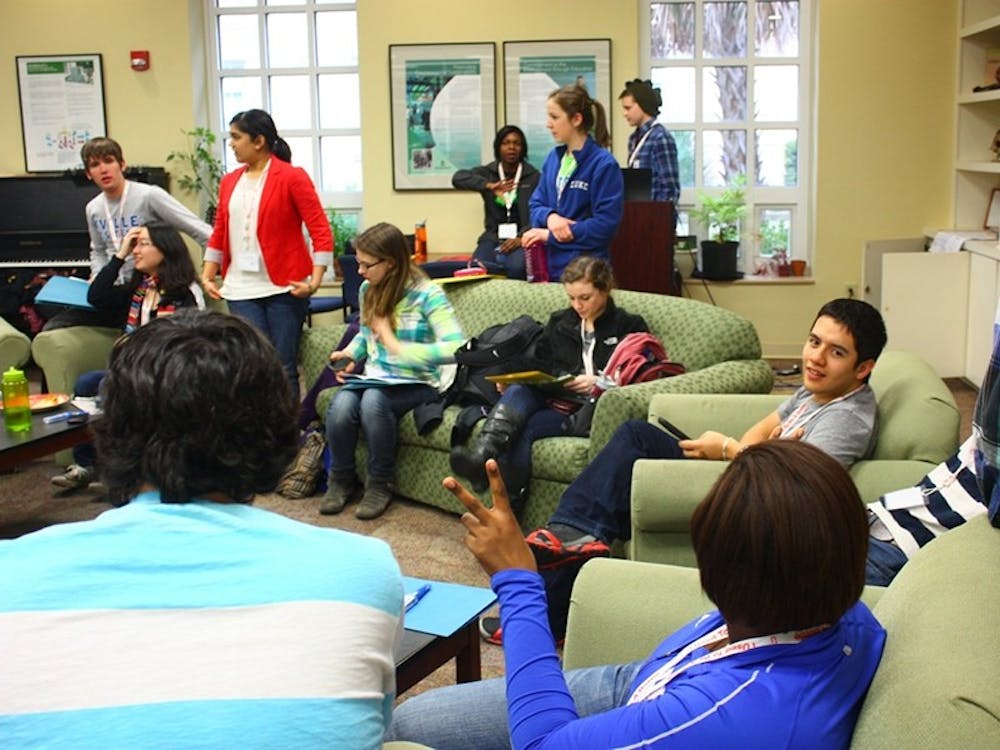Students from 16 schools share ideas, motivation at conference
USC hosted the Southeastern EcoReps Conference last weekend for the second straight year.
Eighty-five students and faculty advisers from 16 schools in the region, including Clemson, Duke, the University of Tennessee and the University of North Texas, gathered to discuss ideas about the EcoReps program and other sustainability organizations.
EcoReps is a peer leadership program run through University Housing that focuses on promoting environmental sustainability on campus.
USC Housing Coordinator for Environmental Sustainability Margaret Bounds said the weekend’s program focused on four tracks of interest: starting the EcoReps program, hot environmental topics, sustaining the EcoReps program and developing peer leadership skills.
Bounds said the goals of the conference were to “get students re-enthused about sustainability and their work on campus” and to create a network among EcoReps in the region.
“A lot of schools in our area have very new programs, so I thought it would be great if we could get together and talk about the challenges and ideas,” Bounds said.
Presenters from various participating schools discussed topics including “Starting a Green Dorm Room Project,” “Plastics: How They Hurt Our Ocean and How We Can Help,” “Getting Greek Life Involved” and “Cultivating Sustainability, Literacy and Practical Outreach Skills.”
Fourth-year sociology student Rebecca Marasco said meeting with other students at the conference was an inspiration to stay motivated as an organization.
“It’s cool, because you think you’re the only one on campus, not really making moves for a while. It’s easy to get burned out,” Marasco said. “But, lo and behold, there’s someone in North Texas with the same problem, and when you’re together with different perspectives, you can really create a really good solution out of it ... It remotivated us to keep working on our semester campaigns.”
Marasco said she came away with ideas for advertising, reinforcing positive behavior changes and potential events, like a plastic bag drive on campus.
The organization received a $7,500 grant from the Carolina Leadership Office to cover the cost of the carbon-neutral event, Bounds said, but only used about $3,000 or $4,000. Expenses included food for attendees, travel for the keynote speaker and the cost of planting trees in the West (Green) Quad community garden to offset the carbon emissions of attendees’ travel.
USC’s EcoReps first organized the conference last year to work toward redesigning the school’s own program, Bounds said. Forty-five students attended last year’s conference.
There are 16 students in the organization this year, up from 12 last year. Bounds said the organization’s goal is to have 20 EcoReps next year. Ideally, Bounds said, at least one EcoRep would represent each hall government on campus.
“EcoReps are important because of that mindset of understanding environmental issues and social justice issues and being able to communicate that effectively among your peers,” Marasco said. “Whatever vision you have for the campus or whatever you want to share and promote on campus, you can. And there’s a great community and support with EcoReps for that.”
Bounds said promoting environmentally sustainable behaviors among students is more successful when peers demonstrate how to live sustainably and reduce environmental impact.
“EcoReps really try to live by example,” Bounds said.
EcoReps are responsible for campus events and programs that include No Impact Week in the fall, the Green Dorm Room Certification program and “free-cycling” in residence halls.

